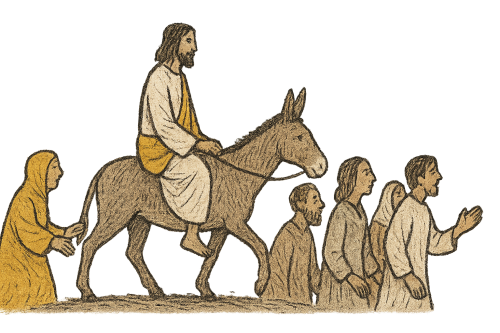Did Jesus claim to be God in the Bible? The short answer is yes – although Jesus did not say the exact phrase “I am God,” He claimed divinity in many ways and made this identity clear to those around Him. In fact, Jesus’ words and actions prompted His contemporaries to recognize this identity and their reactions to his claim also made this clear.
Also check out: Who Did Jesus Say He Was? Exploring What the Bible Says About Jesus’ Identity
Jesus’ Claims of Divinity
I and the father am one
Jesus claimed to be one with God. The notable example is in the Gospel of John, where Jesus said:
“I and the Father are one” (John 10:30).
John 10:30
His Jewish listeners immediately understood this as a claim to deity. The religious leaders picked up stones to execute Him for blasphemy, saying, “because you, a mere man, claim to be God!” In their eyes, Jesus was asserting equality with the Father – a claim punishable by death under Jewish Law (Leviticus 24:16). Far from correcting them, Jesus stood by His claim. He truly was identifying Himself as God.
I AM
Jesus also took for Himself the divine name “I AM.” In another scene, Jesus was debating with the Judeans about Abraham, and He declared,
“before Abraham was born, I am!” (John 8:58).
John 8:58
This statement, “I am,” echoed the sacred name of God revealed in Exodus when God said:
“I AM who I AM” (Exodus 3:14)
Exodus 3:14
Upon hearing this, the crowd again attempted to stone Jesus, recognizing that Jesus was claiming eternal existence and identifying Himself with Yahweh. By saying “I am,” Jesus implied He is God eternal, not just a prophet or teacher. The hostile reaction of His audience shows they clearly understood this meaning

Claiming to Be the Son of God
Jesus was stoned for his claim
Yes, Jesus claimed to be the Son of God – and in the Jewish context of His time, this was not just a respectful title. It was a direct claim to divinity. To modern ears, “son of God” might just sound like a symbolic term. But for Jesus’ audience, especially the Jewish leaders, it carried the weight of deity.
As John explains:
“He was even calling God His own Father, making Himself equal with God.” (John 5:18)
John 5:18
This wasn’t a generic claim that all people are “children of God.” Jesus was claiming a unique, divine relationship with God – one that implied shared essence and authority. That’s why His opponents charged Him with blasphemy.
See more here: Son of Man Meaning in the Bible
Trial of Jesus
This divine claim is most clearly seen at Jesus’ trial before the Sanhedrin. The high priest asked Him directly, “Are you the Messiah, the Son of the Blessed?”. Jesus responded:
“I am. And you will see the Son of Man seated at the right hand of Power, and coming with the clouds of heaven.” (Mark 14:62)
Mark 14:62
Here, Jesus affirms He is the Son of God, and immediately connects this to the divine “Son of Man” figure prophesied in Daniel 7:13-14 – a heavenly being who comes with the clouds to receive worship and an eternal kingdom. By combining these identities, Jesus made an unmistakable claim:
He is the promised Messiah, the Son of God, and the divine Son of Man who shares God’s throne.
That’s why the high priest tore his robes and declared, “You have heard the blasphemy!” The charge wasn’t confusion – it was clarity. Jesus claimed to be far more than a prophet or teacher. He claimed to be much more and everyone there understood.

Old Testament Prophecies of the Divine Messiah
Isaiah predicts Jesus
Long before Jesus was born, the Old Testament hinted that the coming Messiah (who Jesus very clearly claimed to be) would be more than a mere man – He would be God in the flesh. The prophet Isaiah foretold:
“For to us a child is born… and he will be called Wonderful Counselor, Mighty God, Everlasting Father, Prince of Peace” (Isaiah 9:6).
Isaiah 9:6
The Messiah would carry titles of deity. Jesus’ birth, life, and ministry fulfilled this prophecy – He is that child who is rightly called “Mighty God”.
Another prophecy in Isaiah 7:14 said a virgin’s son would be called Immanuel, meaning “God with us.”
“Behold, the virgin will conceive and bear a son, and shall call his name Immanuel” (Isaiah 7:14)
Isaiah 7:14
The New Testament confirms that Jesus fulfilled this:
“they shall call His name Immanuel (which means, God with us)” (Matthew 1:23)
Matthew 1:23
By applying such prophecies to Jesus, Jesus is indeed God come to be with His people.
Jesus’ Actions Affirmed His Deity
Forgiving sins
Not only did Jesus say things that revealed His divinity, but His actions also backed up His claims. He did things only God has authority to do – for instance, He forgave sins:
“When Jesus saw their faith, he said to the paralyzed man, “Son, your sins are forgiven.” (Mark 2:5–7)
Mark 2:5–7
Accepting Worship
And accepted worship from others. After Jesus’ resurrection, the apostle Thomas addressed Him as,
“My Lord and my God!” (John 20:28)
John 20:28
Jesus did not correct him. Instead, Jesus accepted Thomas’s worship and faith. Similarly, other disciples worshiped Jesus and Jesus welcomed it. This is significant, because if Jesus were not God, accepting worship would be wrong – yet He received it as rightful.
The New Testament writers also refer to Jesus as God
“our great God and Savior” (Titus 2:13).
Titus 2:13
All of these affirmations make sense only if Jesus truly is God.
The Bible provides a clear answer to “Did Jesus claim He was God?” – Yes, He did. Jesus may not have spoken the specific phrase “I am God,” but through His words, his deeds, looking back at prophecy and how people spoke of him it is clear He proclaimed His divine identity. He claimed unity with the Father, used God’s sacred name for Himself, and openly affirmed He is the Son of God who fulfils the Old Testament promises of God coming to save His people. His contemporaries understood these claims and, in some cases, reacted strongly against Him for it. For believers, these scriptures provide confidence that Jesus is truly God incarnate just as He said.




